Robin Lythgoe's Blog, page 32
April 12, 2013
Playing Tag with Dialogue

Dialogue tags, or attributions, tell the reader who's speaking. The default setting is he said/she said. Easy, right? Nice and straightforward, nothing complicated. It's practically invisible, until the author throws forty-seven of them into one page. Some authors feel an overwhelming urge to spice things up and get creative; they want to make sure the reader really understands the dialogue and accompanying emotion. They bombard us with synonyms and avoid he said/she said as if they were fatal diseases.
I'm reading a novel by a popular author, and came under an assault that very nearly made me put the book down. (Curiosity prompts me to continue.) A scene between two characters went something like this:
"I don't care where they came from," John pointed out dryly.
"I think you should," James responded impatiently.
"They'll all be dead soon, anyway," John snapped.
"Think of the damage they will cause before then," James replied with condescending mildness. "They can be quite subtle."
"It's contained. Damage will be minimal," John answered.
"You hope so," James returned.
"You worry too much," John replied impatiently.There were a few more sentences involved, but these synonyms (complete with accompanying adverbs) peppered one entire page on my eReader and didn't stop there. The problem is that the author is trying to make sure the reader gets what's going on by describing the dialogue, and doubles the offense by explaining how it was said. Nowhere in this passage did the two characters act.
In a two-person dialogue scene, you don't generally need attributions at all except as occasional reminders. An action tag can give dialogue—and characterization—a significant boost and lend tension to a scene. Let's see how things could have gone with John and James:
"I don't care where they came from." John didn't look up from the papers in his hand.
"I think you should."
"They'll all be dead soon, anyway." He shoved the sheaf into a drawer and shut it. Hard.
"Think of the damage they will cause before then." James kept his voice quiet, the way he always did when he knew he was right. "They can be quite subtle."
"It's contained. Damage will be minimal." It took an effort to keep his temper. His hands trembled.
"You hope so."
The soft warning sent a chill up his spine. Maybe there was more to this situation than met the eye. He didn't want to believe it. Wouldn't. "You worry too much."Another sign of dialogue insecurity is too many direct references. We got a little taste of that in the first example, where the author labeled each and every line with a name. Another way to do it is by having the characters repeatedly addressing each other:
"Someone has to worry, John. Someone has to mind the details."
"Are you saying I don't, James?"
"I'm saying you see the world through a fog of butterflies and rainbows, John."
"Well, that's a fine way to talk to a friend, James."When was the last time you had a conversation like that? Probably never. Occasionally we use a person's name when we speak to him, and usually it's an expression of affection. (Or fury!) The same thing applies in fictional dialogue. Constant use of direct references is awkward and artificial. Worse, the reader can easily see the author's unwelcome hand busy at work. Trust the reader to understand the clues you give him: the change of paragraph, the subtle attributions (he said/she said), the style of speech, and the substance of the dialogue itself.
Lastly, remember that action tags are not dialogue tags. For instance, people can't smile words, which seems to be a very popular trend. I have, I hate to admit, fallen occasionally into that puddle. Thank goodness for the Magical Pen of Editing! You can combine an action with said, or you can make the action stand on its own with the use of a comma. This:
"You take such good care of me, James," he said, and smiled.Never this:
"You take such good care of me, James," he smiled.What are some of your favorite dialogue-writing tips?
:-:-:-:-:-:-:-:-:-:-:-:-:-:-:-:-:-:-:-:-:-:-:-:-:
P.S. I'd like to take this moment to insert a shameless plug. I am celebrating the print release of my novel, As the Crow Flies, with a blog tour in early June. There will be a giveaway! If you can donate a spot on your blog, please sign up here: As the Crow Flies Blog Tour. Your tweets and Facebook announcements are also much appreciated!
Published on April 12, 2013 15:12
April 8, 2013
"As the Crow Flies" Blog Tour
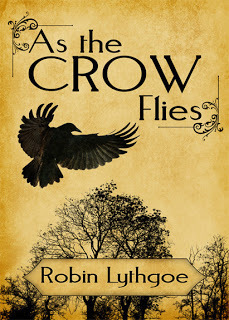 As the Crow Flies is coming in paperback! I couldn't be more excited. To celebrate the upcoming release I am setting up a virtual book tour for the week of June 3-9. What's on the itinerary?
As the Crow Flies is coming in paperback! I couldn't be more excited. To celebrate the upcoming release I am setting up a virtual book tour for the week of June 3-9. What's on the itinerary?A giveawayInterviewsGuest postsExcerptsReviews*SpotlightsBook Description“One more job” means that Crow, a notorious thief, can retire with Tarsha, the woman of his dreams, but “one more job” may just mean his life.
When Crow sets out to steal that last brilliant treasure and seek a life of ease and pleasure with the jewel of his heart, he seriously underestimates his mark, the Baron Duzayan. For a thief, getting caught is never a good thing. Getting caught by a wizard is even worse. Under threat of death by poison, Crow is coerced into stealing an improbable, mythical prize. To satisfy the wizard's greed and save the life of his lady love, he must join forces with Tanris, the one man Crow has spent his entire career avoiding.
But what's a man to do when stealing that fabled prize could level an empire and seal his fate?
From a dungeon black as night, to the top of a mountain peak shrouded in legend, a man’s got to do what he must.
Unless, of course, he can think of a better plan…Praise From Reviews
I was pleased to discover an interesting story line and an engaging and complex protagonist whose voice and personality evolve throughout the novel. — V. Burnett
From the moment I opened this book to when I closed it I was caught up in the adventures of a charming, sarcastic, and clever thief who stole a very large chunk of time from me, but it was well worth the theft. A delightful time was spent in another world filled with adventure, mystery (I love mystery!), wizards, and magic... — M.C.
I loved it from start to finish and it leaves you wanting more. Robin is amazing at describing the picture so it is real in your head. Crow, the main character, was a lovable thief with a wonderful sense of humor. — Marla Oveson
I love a good cloak and purse-cutting dagger, and Crow delivers. He's armed with a silver tongue, sleeping dust, feet that'd make a cat feel ungainly, a razor mind, and a diploma for best-in-class at the school of fine thieving and infiltration (awarded by me). I've read about approximately a billion thieves and even played the vintage first-person-looter games Thief, but Crow still impressed me as a sterling example of skulduggery. — A. E.
If you are interested in hosting a stop on the virtual tour and/or would like to review the book, please leave a comment with the following:
-Blog Name/URL
-Date Request
-What type of stop you would like to host
*E-book copies of As the Crow Flies are available for reviewers.
Published on April 08, 2013 08:54
April 5, 2013
Blast! (And Drat! Or... "The Best-Laid Plans")
 Blast! Drat! and FOOEY!
Blast! Drat! and FOOEY!I have come to the realization, after exercising my patience nearly into oblivion, that the name of Comcast's "Blast! Internet Service" has nothing at all to do with speed and everything to do with the reaction of customers when their connection regularly slows to a standstill, whether hard-wired in or not. Fearing my browser was the culprit, I've tried two others. It doesn't help. Neither, you should know, does jumping up and down and hollering "Blast! Blast! BLAST!", though it did contribute to my cardio workout.
As luck would have it, being productive today depended upon having an internet connection for research I needed to do. And the blog post I planned to put up this morning, well—It's not morning anymore, and I've decided to save that particular announcement for next week. My last shred of optimism for the day suggests that it might be better timing anyway. Whilst waiting for pages to load—or emails to take flight (See? Not the browser!)—I worked on some banners for an upcoming event, so I can't really say the day was entirely lost. Also, my daughter brought me chocolate. Very Important Stuff. And Grimm is on tonight. I can watch Nick, Munroe, and cool monsters while I'm savoring dark chocolate Kisses.

In Writing News, I have been struggling mightily with Sherakai's story—or rather how to go about accomplishing it in a manner that satisfies me. I wrote an awesome 50K during a NaNoWriMo stint (Yay! She's a winner!), and I like it. Very much. I just... haven't liked it as the Official Beginning of the series until the other morning when, during a moment of plaguey insomnia, I figured out how I could move from it to the next book, and that it would all work out very nicely and still give me the character/reader exploration I was hooked on. However, I am going to have to change the original title. Ugh. And drat! I have the hardest time coming up with titles! Perusing the lists of fantasy novels I am awed and captivated by such names as The Way of Kings, A Wise Man's Fear, Exile's Gate, Furies of Calderon, and Bloodfire Quest. What have I got? Lie Down in Darkness. Doubtful Dark. And Dark— BLAH.
But...
Crow's book, As the Crow Flies, was originally titled The Sharpness of the Knife. The knife gave up its role in that tale, but I can see it performing very nicely in Sherakai's... Mmmmmhm.
And now it's time for a little light entertainment, Grimm style.
Published on April 05, 2013 19:03
March 29, 2013
Passive vs. Non-Aggressive Voice
I love a good info-graphic, and this one is a good follow-up to my last post, in which I lamented the shortcomings of using the passive voice. Sometimes that "be" verb is necessary, but often—usually—it can be replaced with action verbs that draw a reader happily to the conclusion of a book. Hopefully, he'll have a smile on his face and look slightly disheveled after the thrilling experience...
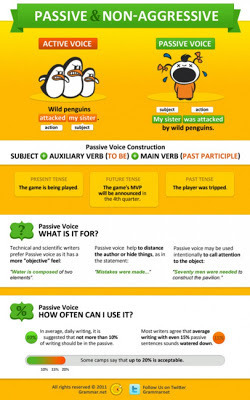 Courtesy of grammar.netThe subject is continued if you want to further investigate Filter Words, which "unnecessarily filter the reader’s experience through a character’s point of view." (Dark Angel, author of the now defunct Dark Angel Writing and Reviews.com) What do filter words look like? They are often sensory words such as the following:
Courtesy of grammar.netThe subject is continued if you want to further investigate Filter Words, which "unnecessarily filter the reader’s experience through a character’s point of view." (Dark Angel, author of the now defunct Dark Angel Writing and Reviews.com) What do filter words look like? They are often sensory words such as the following:
to seeto hearto thinkto touchto watchto lookto feel (or feel like)They aren't limited to just those, however. That would be far too simple, right? Suzannah Windsor Freeman goes into more depth in her excellent, bookmark-worthy article, Are These Filter Words Weakening Your Fiction? When I applied the rules to my own writing my beta readers noted a marked improvement. I talked a little about my experience in a previous post, Following the White Rabbit, and the lesson has stuck with me. I now find myself catching the culprits as I write—and as I read. Sometimes those words have a place in our writing; they are right and necessary, and help make the ideas flow into place more smoothly, but use them judiciously! Readers won't likely notice when they're missing (or substituted), but they will trip up on an entire flock of fuzzy wuzzes and friends.
Want to know more? Read these other helpful articles on filter words:You'll Have to Go Through Me: Eliminating Filter WordsFilter WordsFilter Words (Same title, different author!)Do you have trouble with filter words in your writing? How do you handle them?
 Courtesy of grammar.netThe subject is continued if you want to further investigate Filter Words, which "unnecessarily filter the reader’s experience through a character’s point of view." (Dark Angel, author of the now defunct Dark Angel Writing and Reviews.com) What do filter words look like? They are often sensory words such as the following:
Courtesy of grammar.netThe subject is continued if you want to further investigate Filter Words, which "unnecessarily filter the reader’s experience through a character’s point of view." (Dark Angel, author of the now defunct Dark Angel Writing and Reviews.com) What do filter words look like? They are often sensory words such as the following:to seeto hearto thinkto touchto watchto lookto feel (or feel like)They aren't limited to just those, however. That would be far too simple, right? Suzannah Windsor Freeman goes into more depth in her excellent, bookmark-worthy article, Are These Filter Words Weakening Your Fiction? When I applied the rules to my own writing my beta readers noted a marked improvement. I talked a little about my experience in a previous post, Following the White Rabbit, and the lesson has stuck with me. I now find myself catching the culprits as I write—and as I read. Sometimes those words have a place in our writing; they are right and necessary, and help make the ideas flow into place more smoothly, but use them judiciously! Readers won't likely notice when they're missing (or substituted), but they will trip up on an entire flock of fuzzy wuzzes and friends.
Want to know more? Read these other helpful articles on filter words:You'll Have to Go Through Me: Eliminating Filter WordsFilter WordsFilter Words (Same title, different author!)Do you have trouble with filter words in your writing? How do you handle them?
Published on March 29, 2013 08:45
March 22, 2013
Book Review: Sinai by William Smethurst
Are you a connoisseur of Egyptology? I can't really say that I am, though I do enjoy trivial bits of information about the area, the people that lived there, mythology, weapons, and artwork. My dad went on a tour of Egypt and came back with pictures and presents for everyone, and he piqued my curiosity. I also enjoy the occasional historical thriller. When the publisher invited me to read and review this book, I found the description intriguing:
Sounds like it could be a sort of Egyptian "Da Vinci Code," doesn't it?
Not even close. This book falls into the "DNF" (Did Not Finish) category, and I will tell you why:
The publisher, December House, wrote "Sinai was originally released in 1996 but has been rewritten and updated for it's e-book release..." The book got off to a rough (slow and confusing) start, but sometimes first chapters are like that, and I forged onward. The very first page—I am reading this on my Kindle—is mostly one sentence, but with a couple of educational bits thrown in in parentheses. And just in case you missed the second sentence on the page, it is repeated in the beginning of the second paragraph. The author seems pretty fond of this tactic.
Mr. Smethurst is also an ardent devotee of passive voice, which means that the trifling amount of action included in what I read came watered down and at a distance from the reader. In Chapter 12 things got exciting when bullets started flying, but the thrill only lasted for one paragraph. One measly paragraph! Then, suddenly, "He was in Cairo."
I wanted to scream. "What? Wait! Where's the heart-stopping terror? The sound of gunfire? Shouting? Screaming? Anything? I'll take a quiet cold sweat, please." And let's not forget that pernicious "was" that completely killed any lingering hope of excitement.
An accomplice gave the appearance of getting chased through the city and up a pyramid, but it was only an appearance. Nothing really happened. At least not within the reader's view.
Along with the re-writing there should have been some re-editing. The book is decorated with punctuation errors, filter words (that passive voice thing!), several typos, out-of-place abbreviations, repetitious phrases, awkward passages (generally involving conversations), jerky transitions, and a heavy sprinkling of names that perhaps a student of the field would appreciate, but to the author does not attach any emotional weight to them for the more casual reader's benefit. I wanted to like this book. I kept looking for something to like…
At 23%, I checked the progress bar to see how much further I had to go.
At 37% I started avoiding my Kindle and turned to washing dishes, doing laundry, paying bills, attempting to rescue information from my jiggered laptop...
Wait a minute, I like to read! How about if I just read something else instead?
From the Egypt of The Exodus, to an Egypt falling under an Islamic revolution...
A story that starts in 1350BC and ends tomorrow...Sinai, a timeslip thriller for our timeIn 1350 BC the Israelites are driven from Egypt, their journey through the harsh desert of Sinai, their plight and their story to forever be remembered as the Exodus.
In modern day Sinai academic Richard Corrigan discovers a missing German tourist. Suffering from extreme dehydration and talking in an ancient language the tourist recites a prayer to the Egyptian Sun God as he dies.
In revolutionary Cairo, the mysterious Elizabeth St. George takes Corrigan to a city morgue. The corpse he is shown is fresh, yet to his trained eye looks to be 3,500 years old.
In a leafy London street Jihadist terrorists storm Corrigan's flat. It appears he's got too close... but to what?
As Corrigan begins to question how the past can truly affect the present he finds the question changes. Can the present affect the past? Has it already?
Sinai, a timeslip thriller for our time
(From Amazon.com)
Sounds like it could be a sort of Egyptian "Da Vinci Code," doesn't it?
Not even close. This book falls into the "DNF" (Did Not Finish) category, and I will tell you why:
The publisher, December House, wrote "Sinai was originally released in 1996 but has been rewritten and updated for it's e-book release..." The book got off to a rough (slow and confusing) start, but sometimes first chapters are like that, and I forged onward. The very first page—I am reading this on my Kindle—is mostly one sentence, but with a couple of educational bits thrown in in parentheses. And just in case you missed the second sentence on the page, it is repeated in the beginning of the second paragraph. The author seems pretty fond of this tactic.
Mr. Smethurst is also an ardent devotee of passive voice, which means that the trifling amount of action included in what I read came watered down and at a distance from the reader. In Chapter 12 things got exciting when bullets started flying, but the thrill only lasted for one paragraph. One measly paragraph! Then, suddenly, "He was in Cairo."
I wanted to scream. "What? Wait! Where's the heart-stopping terror? The sound of gunfire? Shouting? Screaming? Anything? I'll take a quiet cold sweat, please." And let's not forget that pernicious "was" that completely killed any lingering hope of excitement.
An accomplice gave the appearance of getting chased through the city and up a pyramid, but it was only an appearance. Nothing really happened. At least not within the reader's view.
Along with the re-writing there should have been some re-editing. The book is decorated with punctuation errors, filter words (that passive voice thing!), several typos, out-of-place abbreviations, repetitious phrases, awkward passages (generally involving conversations), jerky transitions, and a heavy sprinkling of names that perhaps a student of the field would appreciate, but to the author does not attach any emotional weight to them for the more casual reader's benefit. I wanted to like this book. I kept looking for something to like…
At 23%, I checked the progress bar to see how much further I had to go.
At 37% I started avoiding my Kindle and turned to washing dishes, doing laundry, paying bills, attempting to rescue information from my jiggered laptop...
Wait a minute, I like to read! How about if I just read something else instead?
Published on March 22, 2013 17:04
Book Review: Sinai
Are you a connoisseur of Egyptology? I can't really say that I am, though I do enjoy trivial bits of information about the area, the people that lived there, mythology, weapons, and artwork. My dad went on a tour of Egypt and came back with pictures and presents for everyone, and he piqued my curiosity. I also enjoy the occasional historical thriller. When the publisher invited me to read and review this book, I found the description intriguing:
Sounds like it could be a sort of Egyptian "Da Vinci Code," doesn't it?
Not even close. This book falls into the "DNF" (Did Not Finish) category, and I will tell you why:
The publisher, December House, wrote "Sinai was originally released in 1996 but has been rewritten and updated for it's e-book release..." The book got off to a rough (slow and confusing) start, but sometimes first chapters are like that, and I forged onward. The very first page—I am reading this on my Kindle—is mostly one sentence, but with a couple of educational bits thrown in in parentheses. And just in case you missed the second sentence on the page, it is repeated in the beginning of the second paragraph. The author seems pretty fond of this tactic.
Mr. Smethurst is also an ardent devotee of passive voice, which means that the trifling amount of action included in what I read came watered down and at a distance from the reader. In Chapter 12 things got exciting when bullets started flying, but the thrill only lasted for one paragraph. One measly paragraph! Then, suddenly, "He was in Cairo."
I wanted to scream. "What? Wait! Where's the heart-stopping terror? The sound of gunfire? Shouting? Screaming? Anything? I'll take a quiet cold sweat, please." And let's not forget that pernicious "was" that completely killed any lingering hope of excitement.
An accomplice gave the appearance of getting chased through the city and up a pyramid, but it was only an appearance. Nothing really happened. At least not within the reader's view.
Along with the re-writing there should have been some re-editing. The book is decorated with punctuation errors, filter words (that passive voice thing!), several typos, out-of-place abbreviations, repetitious phrases, and a heavy sprinkling of names that perhaps a student of the field would appreciate, but the author does not attach any emotional weight to for the more casual reader's benefit.
At 23%, I checked the progress bar to see how much further I had to go.
At 37% I started avoiding my Kindle and turned to washing dishes, doing laundry, paying bills, attempting to rescue information from my jiggered laptop...
Wait a minute, I like to read! How about if I just read something else instead?
From the Egypt of The Exodus, to an Egypt falling under an Islamic revolution...
A story that starts in 1350BC and ends tomorrow...Sinai, a timeslip thriller for our timeIn 1350 BC the Israelites are driven from Egypt, their journey through the harsh desert of Sinai, their plight and their story to forever be remembered as the Exodus.
In modern day Sinai academic Richard Corrigan discovers a missing German tourist. Suffering from extreme dehydration and talking in an ancient language the tourist recites a prayer to the Egyptian Sun God as he dies.
In revolutionary Cairo, the mysterious Elizabeth St. George takes Corrigan to a city morgue. The corpse he is shown is fresh, yet to his trained eye looks to be 3,500 years old.
In a leafy London street Jihadist terrorists storm Corrigan's flat. It appears he's got too close... but to what?
As Corrigan begins to question how the past can truly affect the present he finds the question changes. Can the present affect the past? Has it already?
Sinai, a timeslip thriller for our time
(From Amazon.com)
Sounds like it could be a sort of Egyptian "Da Vinci Code," doesn't it?
Not even close. This book falls into the "DNF" (Did Not Finish) category, and I will tell you why:
The publisher, December House, wrote "Sinai was originally released in 1996 but has been rewritten and updated for it's e-book release..." The book got off to a rough (slow and confusing) start, but sometimes first chapters are like that, and I forged onward. The very first page—I am reading this on my Kindle—is mostly one sentence, but with a couple of educational bits thrown in in parentheses. And just in case you missed the second sentence on the page, it is repeated in the beginning of the second paragraph. The author seems pretty fond of this tactic.
Mr. Smethurst is also an ardent devotee of passive voice, which means that the trifling amount of action included in what I read came watered down and at a distance from the reader. In Chapter 12 things got exciting when bullets started flying, but the thrill only lasted for one paragraph. One measly paragraph! Then, suddenly, "He was in Cairo."
I wanted to scream. "What? Wait! Where's the heart-stopping terror? The sound of gunfire? Shouting? Screaming? Anything? I'll take a quiet cold sweat, please." And let's not forget that pernicious "was" that completely killed any lingering hope of excitement.
An accomplice gave the appearance of getting chased through the city and up a pyramid, but it was only an appearance. Nothing really happened. At least not within the reader's view.
Along with the re-writing there should have been some re-editing. The book is decorated with punctuation errors, filter words (that passive voice thing!), several typos, out-of-place abbreviations, repetitious phrases, and a heavy sprinkling of names that perhaps a student of the field would appreciate, but the author does not attach any emotional weight to for the more casual reader's benefit.
At 23%, I checked the progress bar to see how much further I had to go.
At 37% I started avoiding my Kindle and turned to washing dishes, doing laundry, paying bills, attempting to rescue information from my jiggered laptop...
Wait a minute, I like to read! How about if I just read something else instead?
Published on March 22, 2013 17:04
March 15, 2013
Fantasy and Magic Systems - Guest Post by Jon Thomason
Today I am lucky to have guest Jon Thomason as part of the blog tour hosted by I Am a Reader, Not a Writer. Jon is the author of Max Xylander and the Island of Zumuruud, "a fast-paced fantasy adventure for all ages. Fans of magic, swordplay, secret agents, and conspiracies set in a modern everyday world will not be able to put the book down. Jon Thomason paints a vivid world of magic right under our noses and delivers rapid-fire action that keeps the pages turning."
I've asked Jon why he chose to write fantasy, and what were his feelings about "magic systems." His response certainly touches a chord with me. Read on—and stay tuned for the blog tour giveaway!
Hello Readers, my name is Jon Thomason and I'm the author of Max Xylander and the Island of Zumuruud.
I'd like to talk about fantasy writing today. Fantasy is one of the most fulfilling genres for a novelist to write because you are allowed, indeed expected, to really stretch your imagination and that of your readers. Most, but not all, fantasy books involve some use of magic. This is really great fun because even if set in the modern world, like Max, using magic carries the writer somewhere they haven't been before.
In Max, we get the fun of watching Max (short for Maxine) discover that she can do magic and learn how to control it--with explosive results. As readers, we love stories that carry us away, and especially those where we can imagine doing something new.
You might say that this is all obvious. Indeed. But what might not be is why fantasy writers all come up with some "magic system," or perhaps seemingly arbitrary rules for how "their" magic works. In my opinion, it's poorly written fantasy that changes the rules or introduces new ones as plot devices midway or later through the book. It's jarring and can make you drop your "suspension of disbelief." But still, why the systems? The answer lies in how stories, or in other words, book plotting, works.
Let's look at a very classic example. Most western literature written about genies has them giving the discoverer only three wishes. The genie is essentially infinitely powerful (usually a no-no), but the system is that only three, carefully worded, wishes are allowed. The bound on the wishes is a critical plot device. Otherwise, the power is infinite, and with infinite power, there can be no conflict, and hence, no story.
More fantasy magic systems impose limits on the magician to allow for a story. Again, infinite power equals no story, so we have to avoid that. Many magic systems have the use of magic taking a toll on the magician. Some have casting a spell reducing the lifespan of the caster, while others exhaust the caster to limit the number of successive spells. The magic itself is often far from invincible. The magician may be forced to memorize long spells, whose books may cost a great deal of money or be found only via a difficult quest. The magic itself may be quite limited in effect or may even backfire.
The worst magic systems are when the limits are transparently plot devices and feel arbitrary to the reader. Even worse is when the rules change "conveniently" to enable something specific to happen in the plot.
Most rewarding is when we learn alongside the magician character and feel what it would be like to be doing magic in the character's place. It's particularly fun when some method of using the power is learned early on and becomes key to the ultimate conclusion of the story. "Why didn't I think of that?" (fully realizing that you could have thought of it) is success. Feeling cheated because the a rule of the universe was broken to resolve the story is horrible.
Magic systems need to feel like immutable laws of physics--a new physics that we learn from reading.
Thanks for reading, and I encourage you to read Max Xylander and the Island of Zumuruud. Let me know @jonthomason on Twitter if you like the magic system in Max and if I was able to keep the spirit of my own rules!
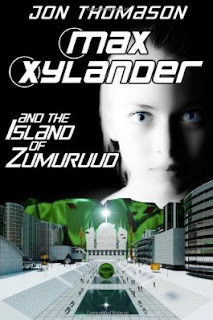 Max Xylander and the Island of Zumuruud
Max Xylander and the Island of Zumuruud
Max has anger management issues. But she has a dangerous secret, too. She can make things happen. Like magic. She almost killed a kid and nearly used it on her stuck up older sister. Can she learn to do anything other than blow things up? And is it really possible that a teenage girl is the key to keeping humanity safe?
Philip just got his ring back. He got it taken away for messing with his teacher's mind to cheat on a test. Now that he has his ring, he thinks he should be able to use his power to make his life better. But people want him to be responsible. But if you could do magic, wouldn't you use it to escape work?
Aaron wants to be a soldier. Lots of people would try to take over, and he's determined to stop them. The problem is that there's this new girl who might be not be on the right side of things. She's really talented and pretty, but she might be able to destroy everything. Whatever happens, he needs to be world class with his magic sword while figuring it out.
Brynn never gets out. Her grandfather won't permit it. Her access to the outside world is magazines, so she has unusual ideas about what to wear. She's dying to travel. And adopt animals. Is she a lonely future cat granny or are her clothes the next fashion craze?
Purchase
Amazon * Barnes & Noble
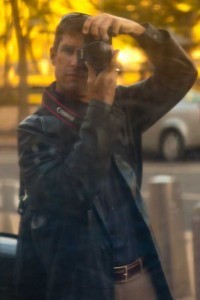
Author Jon Thomason
Jon Thomason lives with his family in San Diego, after many years living in the beautiful Seattle area.
He has a successful career in high tech where he's been fortunate enough to participate in many big-name industry releases. Storytelling permeates everything he does. In the moments when Jon is not helping build the story of the tech world, he can almost always be found working on a project: writing, photography, videography, graphics design, or 3D art.
And he's always careful to conceal his jinni magic abilities, though perhaps might slip one day and be discovered...
Facebook * Twitter
Blog Tour Giveaway
$50 Amazon Gift Card or Paypal Cash plus a copy of Max Xylander and the Island of Zumuruud
Print copy to US only, Ebook Internationally
Ends 3/31/13
a Rafflecopter giveaway
I've asked Jon why he chose to write fantasy, and what were his feelings about "magic systems." His response certainly touches a chord with me. Read on—and stay tuned for the blog tour giveaway!
Hello Readers, my name is Jon Thomason and I'm the author of Max Xylander and the Island of Zumuruud.
I'd like to talk about fantasy writing today. Fantasy is one of the most fulfilling genres for a novelist to write because you are allowed, indeed expected, to really stretch your imagination and that of your readers. Most, but not all, fantasy books involve some use of magic. This is really great fun because even if set in the modern world, like Max, using magic carries the writer somewhere they haven't been before.
In Max, we get the fun of watching Max (short for Maxine) discover that she can do magic and learn how to control it--with explosive results. As readers, we love stories that carry us away, and especially those where we can imagine doing something new.
You might say that this is all obvious. Indeed. But what might not be is why fantasy writers all come up with some "magic system," or perhaps seemingly arbitrary rules for how "their" magic works. In my opinion, it's poorly written fantasy that changes the rules or introduces new ones as plot devices midway or later through the book. It's jarring and can make you drop your "suspension of disbelief." But still, why the systems? The answer lies in how stories, or in other words, book plotting, works.
Let's look at a very classic example. Most western literature written about genies has them giving the discoverer only three wishes. The genie is essentially infinitely powerful (usually a no-no), but the system is that only three, carefully worded, wishes are allowed. The bound on the wishes is a critical plot device. Otherwise, the power is infinite, and with infinite power, there can be no conflict, and hence, no story.
More fantasy magic systems impose limits on the magician to allow for a story. Again, infinite power equals no story, so we have to avoid that. Many magic systems have the use of magic taking a toll on the magician. Some have casting a spell reducing the lifespan of the caster, while others exhaust the caster to limit the number of successive spells. The magic itself is often far from invincible. The magician may be forced to memorize long spells, whose books may cost a great deal of money or be found only via a difficult quest. The magic itself may be quite limited in effect or may even backfire.
The worst magic systems are when the limits are transparently plot devices and feel arbitrary to the reader. Even worse is when the rules change "conveniently" to enable something specific to happen in the plot.
Most rewarding is when we learn alongside the magician character and feel what it would be like to be doing magic in the character's place. It's particularly fun when some method of using the power is learned early on and becomes key to the ultimate conclusion of the story. "Why didn't I think of that?" (fully realizing that you could have thought of it) is success. Feeling cheated because the a rule of the universe was broken to resolve the story is horrible.
Magic systems need to feel like immutable laws of physics--a new physics that we learn from reading.
Thanks for reading, and I encourage you to read Max Xylander and the Island of Zumuruud. Let me know @jonthomason on Twitter if you like the magic system in Max and if I was able to keep the spirit of my own rules!
 Max Xylander and the Island of Zumuruud
Max Xylander and the Island of ZumuruudMax has anger management issues. But she has a dangerous secret, too. She can make things happen. Like magic. She almost killed a kid and nearly used it on her stuck up older sister. Can she learn to do anything other than blow things up? And is it really possible that a teenage girl is the key to keeping humanity safe?
Philip just got his ring back. He got it taken away for messing with his teacher's mind to cheat on a test. Now that he has his ring, he thinks he should be able to use his power to make his life better. But people want him to be responsible. But if you could do magic, wouldn't you use it to escape work?
Aaron wants to be a soldier. Lots of people would try to take over, and he's determined to stop them. The problem is that there's this new girl who might be not be on the right side of things. She's really talented and pretty, but she might be able to destroy everything. Whatever happens, he needs to be world class with his magic sword while figuring it out.
Brynn never gets out. Her grandfather won't permit it. Her access to the outside world is magazines, so she has unusual ideas about what to wear. She's dying to travel. And adopt animals. Is she a lonely future cat granny or are her clothes the next fashion craze?
Purchase
Amazon * Barnes & Noble

Author Jon Thomason
Jon Thomason lives with his family in San Diego, after many years living in the beautiful Seattle area.
He has a successful career in high tech where he's been fortunate enough to participate in many big-name industry releases. Storytelling permeates everything he does. In the moments when Jon is not helping build the story of the tech world, he can almost always be found working on a project: writing, photography, videography, graphics design, or 3D art.
And he's always careful to conceal his jinni magic abilities, though perhaps might slip one day and be discovered...
Facebook * Twitter
Blog Tour Giveaway
$50 Amazon Gift Card or Paypal Cash plus a copy of Max Xylander and the Island of Zumuruud
Print copy to US only, Ebook Internationally
Ends 3/31/13
a Rafflecopter giveaway
Published on March 15, 2013 08:35
March 1, 2013
Book Review: The Farseer Trilogy
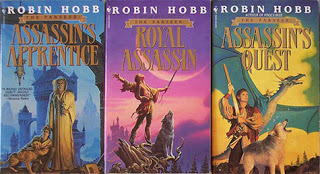 In the mood to read a good, solid fantasy trilogy, I picked up the Farseer series by Robin Hobb. It was highly recommended on every “Top Fantasy Reads” list I looked at. That’s really saying something, eh? “Assassin’s Apprentice” (Book 1) begins with the main character as an old man recalling his life story, starting at the tender age of six. Right away, the reader knows she’s in for an ambitious story. Being a writer myself, I appreciate the foreshadowing that Hobbs deftly employed here as well as the organization that goes behind it. The author has a straightforward style that is easy to read. Her character development is amazing, and she takes the time to “grow” the individuals, and they are wonderfully depicted as believable people with natural flaws and foibles. There are no instant advancements or ready-made solutions to either their development or the story’s. Hobbs also does a fine job with setting development, and her plot is just convoluted enough to make things interesting without being confusing.
In the mood to read a good, solid fantasy trilogy, I picked up the Farseer series by Robin Hobb. It was highly recommended on every “Top Fantasy Reads” list I looked at. That’s really saying something, eh? “Assassin’s Apprentice” (Book 1) begins with the main character as an old man recalling his life story, starting at the tender age of six. Right away, the reader knows she’s in for an ambitious story. Being a writer myself, I appreciate the foreshadowing that Hobbs deftly employed here as well as the organization that goes behind it. The author has a straightforward style that is easy to read. Her character development is amazing, and she takes the time to “grow” the individuals, and they are wonderfully depicted as believable people with natural flaws and foibles. There are no instant advancements or ready-made solutions to either their development or the story’s. Hobbs also does a fine job with setting development, and her plot is just convoluted enough to make things interesting without being confusing.That being said, and I am looking at the series as a whole, there are some places where the story dragged enough to make me want to skip ahead. I understand that she tried to make each of the three novels work more or less as a standalone. However, this involved boring and copious amounts of repetition made worse by editorial gaffs in which words and/or phrases were often duplicated—in the same paragraph, no less.
I found the first book the least engaging, and if I had not set out to read the trilogy, I would have quit there. The ending did nothing to encourage me to pick up the next book. In spite of that, I’m glad I did. I cried my way through the last couple of chapters. In the end, I felt sympathy and a real fondness for not just the main character, Fitz, but for most of the supporting cast. As another reviewer said, “If you want a story that can pull you in, wring you out, and leave you feeling like you have really been through something, then read this.”
Published on March 01, 2013 10:41
January 31, 2013
Julie Forward DeMay, The Cell War Notebooks, and the Power of Words
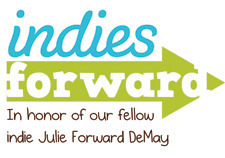 Today, January 31st, is IndiesForward day – a special blogging event dedicated to spreading the legacy of Julie Forward DeMay and her touching memoir, The Cell War Notebooks.
Today, January 31st, is IndiesForward day – a special blogging event dedicated to spreading the legacy of Julie Forward DeMay and her touching memoir, The Cell War Notebooks.What would you do when faced with a battle for your life? Author, photographer and creative spirit Julie Forward DeMay took on her fight with cervical cancer like she was playing for the new high score in her favorite video game, Asteroids. Inspiring, witty, beautiful and brutally honest, The Cell War Notebooks is a compilation of the blog Julie kept during the last seven months of her life. It’s a powerful read for anyone, whether your life has been touched by cancer or not. Check out the paperback on Amazon and keep up with the latest news on Facebook. All proceeds from book sales go to Julie’s nine year-old daughter.
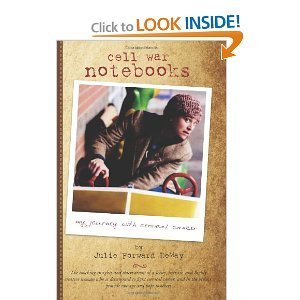
My mother lost her battle against breast cancer ten years ago next month. Curiously, it isn't February that is difficult for me, but December. The two of us shared a birthday, and while she used to tell me that I was the best birthday gift she'd ever had, the reverse is also true. She was a quiet person, an artist, a crafter, and a reader. She gave to me, among other things, my appreciation for books. We had all kinds of books in our house, and I have many fond memories of exploring them: perching at the top of the stairs next to a shelf boasting two different encyclopedia sets that held my rapt attention even when I was in grade school, a shelf in the living room stuffed with National Geographic magazines, the constant arrival of the Reader's Digest Condensed Books, the children's books I shared with my sister on our own dedicated shelf near our room, the shelves that bracketed the fireplace and revealed another set of encyclopedias (I have a hazy memory of discovering Edgar Rice Burroughs there as well as Mary Stewart, Louis L'Amour, and Owen Wister), a collection of art and craft books, and regular trips to the library. I used to spend huge amounts of time reading, emulating Mom. The fact that a book could so absorb my mother as to render her senseless even to attempts to tickle her feet only proved to me that books held a special kind of magic.
When she passed away she didn't have much in the way of worldly possessions, but she still had a love of books. Many of them now occupy spaces on the shelves of my own library, and when I see them I inevitably think of her. What a rich heritage, and how incredible that she can still so touch my life. Julie Forward DeMay, too, is touching lives with the memoir she wrote. Words are such powerful things...
For more information about Julie:
The Cell War Notebooks on Amazon: http://amzn.to/W17WN4 The Cell War Notebooks on Facebook: http://facebook.com/cellwarnotebooksJulie’s Original Blog: http://cellwarnotebooks.blogspot.com

Published on January 31, 2013 13:14
January 25, 2013
World Building 101, Guest Post by Patrick W. Carr
I am so pleased to have Patrick W. Carr, author of the fantasy novel "A Cast of Stones," as my guest today as part of the blog tour hosted by I Am a Reader, Not a Writer. Patrick not only writes, but he also teaches high school math in Nashville, Tennessee. Hooray for teachers! Hooray for authors! I enjoyed reading his insights, and I can already see one point I am going to take away from this...
World Building 101
When I set out to write “A cast of Stones” the first thing I did was set my time period. I didn’t want to invest in the ground-up kind of detail that a completely different world would take so I chose to go with a generally medieval setting. I chose 13th century Europe because I didn’t want to deal with cannon when I wrote my ship battles. Plus the use of that time frame dove-tailed nicely with some of the problems and challenges the church had to deal with prior to the Reformation.
The next thing I did was to draw a map. I’m not much of an artist, so Bethany House elected not to include it in the final book, but it was good enough for me to use for plotting purposes. Plus one of the things I’d like to do is have a map drawing contest once we release the second book. The person who comes closest to the map on my wall gets a free autographed copy of the third book or something like that. Another reason the map was so important was that it allowed me to keep track visually of where everyone was. In the second and third book, I have more than one POV character and at times they’re together, but other times they’re scattered to the four winds.
It became apparent early on, once I got a decent way into the first book, that organization was going to be a real challenge. My second son, Connor, is one of the most organized people I know. He came out of the womb that way. There is no way he inherited that gene from me (unless it’s recessive). I struggle with organization. However, I was fortunate in that my writer’s group, MTCW in Nashville, had a couple of sessions on writing tools. We talked about Snowflake and Scrivener. I finally settled on OneNote, probably because that’s what our group leader, Kaye Dacus, used and she could give me tips. There’s nothing like local tech support.
Then I started doing research. Oh man. You wouldn’t believe how many little, inconsequential, annoying details go into a book. There were times when I wanted to scream at all the google windows I had open “Can I just write my book, please?” But of course, you don’t get to do that, because even a well-researched book is going to have a couple of slip-ups in it and one that hasn’t been researched will have a ton. Then the readers come and smack you in the head with your own words. It’s all really too gruesome to contemplate. Here’s a favorite example: You know all those movies where the horses are galloping like mad for miles and miles? Totally bogus. Think of it in people terms. You can’t sprint for very long at all before you have to slow to a jog. Horses can’t either. The fastest way for a horse to cover a lot of ground day-after-day is to trot. I had a horse as a kid (we lived on a farm). The trot is the most obnoxious gait for a rider. It’s an instant recipe for being saddle sore.
After I did enough research to get me going, everything from horses, to clothes, to castles, to herb lore, I was ready to start on my characters. For major characters I tried to picture someone I knew, either personally or from TV and film. Then I loaded their picture into OneNote and started writing their personal history. This step was crucial because one of the themes that I wanted to utilize in my book was that everyone has secrets. I felt this would help to make the characters more three dimensional. One of the ways I knew I was writing well was when my sister, who is my alpha reader, would tell me what she thought the character would look like and it turned out to be really close to the picture I was using.
The last parts of world-building took place after the first draft. For a single novel I needn’t have bothered but for a trilogy, it was a necessity. I went through the book and catalogued every single character, no matter how minor. I knew I was going to need some of them again, even if I wasn’t sure at the moment exactly how. I also devoted a few pages to the theology of the world I was creating and its history. The first draft contained some inconsistencies and this allowed me to smooth those out until I had a workable world.
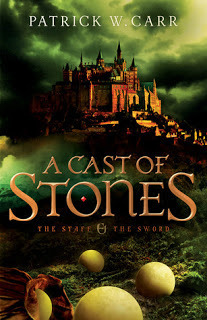 A Cast of Stones
A Cast of Stones
An Epic Medieval Saga Fantasy Readers Will Love
In the backwater village of Callowford, Errol Stone's search for a drink is interrupted by a church messenger who arrives with urgent missives for the hermit priest in the hills. Desperate for coin, Errol volunteers to deliver them but soon finds himself hunted by deadly assassins. Forced to flee with the priest and a small band of travelers, Errol soon learns he's joined a quest that could change the fate of his kingdom.
Protected for millennia by the heirs of the first king, the kingdom's dynasty is near an end and a new king must be selected. As tension and danger mount, Errol must leave behind his drunkenness and grief, learn to fight, and come to know his God in order to survive a journey to discover his destiny.
PurchaseAmazon * Barnes & Noble
 Author Patrick W. Carr
Author Patrick W. Carr
Patrick Carr was born on an Air Force base in West Germany at the height of the cold war. He has been told this was not his fault. As an Air Force brat, he experienced a change in locale every three years until his father retired to Tennessee. Patrick saw more of the world on his own through a varied and somewhat eclectic education and work history. He graduated from Georgia Tech in 1984 and has worked as a draftsman at a nuclear plant, did design work for the Air Force, worked for a printing company, and consulted as an engineer. Patrick’s day gig for the last five years has been teaching high school math in Nashville, TN. He currently makes his home in Nashville with his wonderfully patient wife, Mary, and four sons he thinks are amazing: Patrick, Connor, Daniel, and Ethan. Sometime in the future he would like to be a jazz pianist. Patrick thinks writing about himself in the third person is kind of weird.
Website * Facebook
Blog Tour Giveaway
$10 Amazon Gift Card or Paypal Cash
Ends 1/31/13
Open only to those who can legally enter, receive and use an Amazon.com Gift Code or Paypal Cash. Winning Entry will be verified prior to prize being awarded. No purchase necessary. You must be 18 or older to enter or have your parent enter for you. The winner will be chosen by rafflecopter and announced here as well as emailed and will have 48 hours to respond or a new winner will be chosen. This giveaway is in no way associated with Facebook, Twitter, Rafflecopter or any other entity unless otherwise specified. The number of eligible entries received determines the odds of winning. Giveaway was organized by Kathy from I Am A Reader, Not A Writer http://iamareadernotawriter.blogspot.com and sponsored by the author. VOID WHERE PROHIBITED BY LAW.
a Rafflecopter giveaway
World Building 101
When I set out to write “A cast of Stones” the first thing I did was set my time period. I didn’t want to invest in the ground-up kind of detail that a completely different world would take so I chose to go with a generally medieval setting. I chose 13th century Europe because I didn’t want to deal with cannon when I wrote my ship battles. Plus the use of that time frame dove-tailed nicely with some of the problems and challenges the church had to deal with prior to the Reformation.
The next thing I did was to draw a map. I’m not much of an artist, so Bethany House elected not to include it in the final book, but it was good enough for me to use for plotting purposes. Plus one of the things I’d like to do is have a map drawing contest once we release the second book. The person who comes closest to the map on my wall gets a free autographed copy of the third book or something like that. Another reason the map was so important was that it allowed me to keep track visually of where everyone was. In the second and third book, I have more than one POV character and at times they’re together, but other times they’re scattered to the four winds.
It became apparent early on, once I got a decent way into the first book, that organization was going to be a real challenge. My second son, Connor, is one of the most organized people I know. He came out of the womb that way. There is no way he inherited that gene from me (unless it’s recessive). I struggle with organization. However, I was fortunate in that my writer’s group, MTCW in Nashville, had a couple of sessions on writing tools. We talked about Snowflake and Scrivener. I finally settled on OneNote, probably because that’s what our group leader, Kaye Dacus, used and she could give me tips. There’s nothing like local tech support.
Then I started doing research. Oh man. You wouldn’t believe how many little, inconsequential, annoying details go into a book. There were times when I wanted to scream at all the google windows I had open “Can I just write my book, please?” But of course, you don’t get to do that, because even a well-researched book is going to have a couple of slip-ups in it and one that hasn’t been researched will have a ton. Then the readers come and smack you in the head with your own words. It’s all really too gruesome to contemplate. Here’s a favorite example: You know all those movies where the horses are galloping like mad for miles and miles? Totally bogus. Think of it in people terms. You can’t sprint for very long at all before you have to slow to a jog. Horses can’t either. The fastest way for a horse to cover a lot of ground day-after-day is to trot. I had a horse as a kid (we lived on a farm). The trot is the most obnoxious gait for a rider. It’s an instant recipe for being saddle sore.
After I did enough research to get me going, everything from horses, to clothes, to castles, to herb lore, I was ready to start on my characters. For major characters I tried to picture someone I knew, either personally or from TV and film. Then I loaded their picture into OneNote and started writing their personal history. This step was crucial because one of the themes that I wanted to utilize in my book was that everyone has secrets. I felt this would help to make the characters more three dimensional. One of the ways I knew I was writing well was when my sister, who is my alpha reader, would tell me what she thought the character would look like and it turned out to be really close to the picture I was using.
The last parts of world-building took place after the first draft. For a single novel I needn’t have bothered but for a trilogy, it was a necessity. I went through the book and catalogued every single character, no matter how minor. I knew I was going to need some of them again, even if I wasn’t sure at the moment exactly how. I also devoted a few pages to the theology of the world I was creating and its history. The first draft contained some inconsistencies and this allowed me to smooth those out until I had a workable world.
 A Cast of Stones
A Cast of StonesAn Epic Medieval Saga Fantasy Readers Will Love
In the backwater village of Callowford, Errol Stone's search for a drink is interrupted by a church messenger who arrives with urgent missives for the hermit priest in the hills. Desperate for coin, Errol volunteers to deliver them but soon finds himself hunted by deadly assassins. Forced to flee with the priest and a small band of travelers, Errol soon learns he's joined a quest that could change the fate of his kingdom.
Protected for millennia by the heirs of the first king, the kingdom's dynasty is near an end and a new king must be selected. As tension and danger mount, Errol must leave behind his drunkenness and grief, learn to fight, and come to know his God in order to survive a journey to discover his destiny.
PurchaseAmazon * Barnes & Noble
 Author Patrick W. Carr
Author Patrick W. CarrPatrick Carr was born on an Air Force base in West Germany at the height of the cold war. He has been told this was not his fault. As an Air Force brat, he experienced a change in locale every three years until his father retired to Tennessee. Patrick saw more of the world on his own through a varied and somewhat eclectic education and work history. He graduated from Georgia Tech in 1984 and has worked as a draftsman at a nuclear plant, did design work for the Air Force, worked for a printing company, and consulted as an engineer. Patrick’s day gig for the last five years has been teaching high school math in Nashville, TN. He currently makes his home in Nashville with his wonderfully patient wife, Mary, and four sons he thinks are amazing: Patrick, Connor, Daniel, and Ethan. Sometime in the future he would like to be a jazz pianist. Patrick thinks writing about himself in the third person is kind of weird.
Website * Facebook
Blog Tour Giveaway
$10 Amazon Gift Card or Paypal Cash
Ends 1/31/13
Open only to those who can legally enter, receive and use an Amazon.com Gift Code or Paypal Cash. Winning Entry will be verified prior to prize being awarded. No purchase necessary. You must be 18 or older to enter or have your parent enter for you. The winner will be chosen by rafflecopter and announced here as well as emailed and will have 48 hours to respond or a new winner will be chosen. This giveaway is in no way associated with Facebook, Twitter, Rafflecopter or any other entity unless otherwise specified. The number of eligible entries received determines the odds of winning. Giveaway was organized by Kathy from I Am A Reader, Not A Writer http://iamareadernotawriter.blogspot.com and sponsored by the author. VOID WHERE PROHIBITED BY LAW.
a Rafflecopter giveaway
Published on January 25, 2013 10:45



